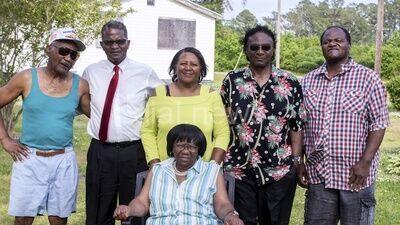Inspired by the ProPublica/New Yorker article by Lizzie Presser, Peck parses the historically racist real estate laws of America, the tyrannical wielding of the justice system against Black folk, and the feeling of when the land becomes you and you become bound to the land. “Silver Dollar Road” is a celebration, an elegy, and a profound recording of a frustrating historical wrong.
“Silver Dollar Road” derives its power from family; throughout the documentary, Peck graphically maintains a family tree of the Reels. The act seems simple but is devastatingly effective. In Antebellum America, the primary tool for weakening arriving African families was to separate them, scattering their shared history and oral traditions across the South. But the Reels, through the town’s three graveyards, have a physical marker of their time in the area. Their oldest living root is the 95-year-old Gertrude Reels, and this film opens with her birthday celebration. She’s been fighting the longest to win back the seaside and remembers the bustling, joyous, freeing life it once offered.
Her daughter Mamie Ellison also remembers the tranquil cove, describing Silver Dollar Road as innocent, magical, and safe. Warm, nostalgic photographs of barbecues, parties, kids swimming, and adults laughing recall the idyllic corners of the region’s past. Peck also meets with other family members, giving them the voice to state their case as he settles his lens on Gertrude’s sons Melvin and Licurtis. Both men had homes on the disputed land and, after decades of battles, were served eviction notices. Rather than leave, they were arrested for trespassing. What’s usually a minimal offense became a multi-year sentence for them.
Through their harrowing story, “Silver Dollar Road” mirrors Garrett Bradley’s “Time,” another film about the crushing toll the justice system places primarily on Black folk. With each passing year of their detainment, the heartache accompanying missed Christmases and stolen days grows bigger.
In their interviews, the family does not necessarily give the case’s specific “legal” facts. They present their evidence through an oral history that runs against the legalese used to ensnare them. Likewise, one of their early attorneys also struggles to explain how the law is specifically applied against the Reels. Sometimes, you wish there was an expert who could guide you through the minutiae of the legalese. The justice system has always been stacked against Black people; there is no doubt about that. But it would still be good to learn the exact “how” even if we already know the “why” (racism).

